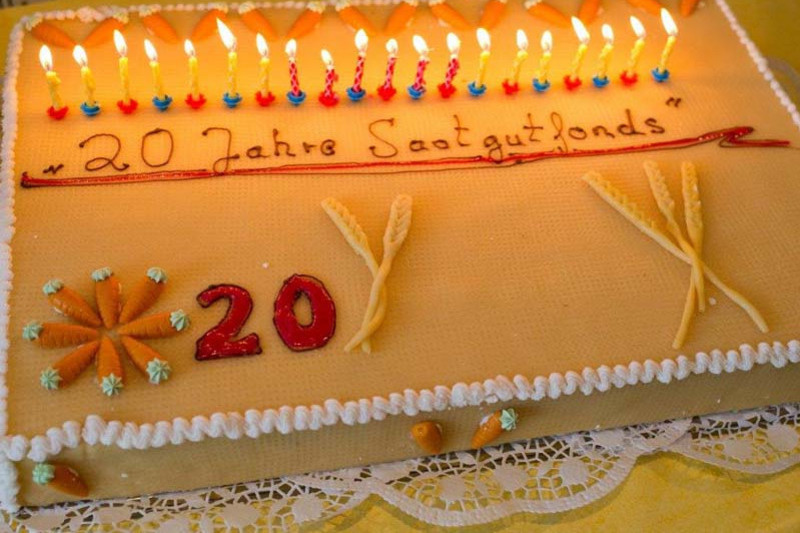Seed Fund Celebrates 20 Year Anniversary

Since 1996, the seed fund of the GLS Zukunftsstiftung Landwirtschaft (“Foundation on Future Farming,” a foundation associated with the GLS bank) has been supporting research and development in the area of organic and sustainable plant breeding. Since 2000, this work has been supported by close cooperation with the Software AG Foundation (SAGST). A meeting in Kassel on the occasion of the project's 20th anniversary was an opportunity to look back on previous achievements and to focus on future challenges.
“Given the increasing concentration of power in the seed market, from genetic engineering to the threat of seed patenting, the issue of seed development is more important than ever,” said Oliver Willing, managing director of the Foundation on Future Farming (Press release, Seed Fund).
“We congratulate our colleagues who have fought tirelessly for 20 years to conserve biodiversity and who have advocated with professionalism, passion, and courage for healthy, true to seed, and organic seeds,” said Klaus Plischke, project manager at SAGST. “Worldwide, only a few major corporations control plant breeding, and those seeds are often patented and can often only be used in conjunction with pesticides from the same company. That's why it's so important that independent, organic plant breeders working for sustainable, organic farming can provide healthy seeds on a long-term basis.” According to Plischke, the seed fund plays a key role in this regard. The seed fund is an independent organisation that distributes funds free of its own economic interests, according to need and necessity. SAGST also supports sustainable, GMO-free seed research with around 300,000 euros per year, following the recommendations of the seed fund in its donations. SAGST furthermore supports the publicity work of the Seed Fund itself. In total, over four million euros have been distributed during the funding period. SAGST also supports other research projects organized by initiatives in biodynamic seed breeding.
About the seed fund:
The Seed Fund is supported by numerous private individuals, foundations, organizations, and companies in the organic industry. The fund is managed and controlled by the Foundation on Future Farming. The Foundation on Future Farming supports organic agriculture and is organized as a non-profit fiduciary foundation within GLS Treuhand e.V.
Press Release of the Seed Fund: Shaping the Future: 20 Years of the Seed Fund
Anniversary conference in Kassel honors ecological plant breeding
Bochum, 03.02.2016 – Since 1996, the Seed Fund of the GLS Zukunftsstiftung Landwirtschaft has supported research and development in the area of organic plant breeding. On the occasion of its 20 year anniversary, around 100 breeders, farmers, donors, and consumers met in Kassel to celebrate what has been achieved and to look forward to meeting future challenges.
Oliver Willing, managing director of the GLS Zukunftsstiftung Landwirtschaft, welcomed the guests at the beginning of the anniversary conference in Kassel and honored the two founding fathers of the seed fund, Albert Fink and Dirk Lücke. Thanks to their foresight and commitment, said Willing, ecological breeding initiatives have been supported for 20 years. The Seed Fund started in 1996 with 140,000 DM; with increasing donations, the fund has now reached a volume of over 1.15 million euros annually. The donations are remarkable, but so are the results produced by this long-term funding: over 70 new varieties of vegetables, all of which are true-to-seed and recognized by the federal seed authority, are being used today, in addition to around 40 new grain varieties.
“Given the increasing concentration of power in the seed market, from genetic engineering to the threat of seed patenting, the issue of seed development is more important than ever,” said Willing. Ecological plant breeding conceives of seeds as a cultural asset - for organic farming, an essential investment. The pioneers of the movement were biodynamic growers who began to make initial efforts to counter the threat of loss of species diversity as early as the 1970s. Dieter Bauer, an early breeder at Dottenfelderhof farm near Frankfurt / Main, was pleased with the current positive response to training opportunities for prospective breeders. He encouraged the next generation to work to further spread eco-seed production and trade: “We breed so new varieties so that farmers use them!” he emphasized.
In multiple working groups and in the closing panel, interested parties from all areas of the value chain, including processing companies and trading partners, discussed how ecologically cultivated plant varieties can be even better supported in the future, for example through transparent labeling and a targeted increase in demand. “The subject of organic seed is no longer the niche topic that it was, but there is still much to do,” concluded Oliver Willing. “In order to expand ecological breeding research, we will continue to need massive financial support from donors, because the breeders cannot bear the enormous costs.” This makes it even more important to raise awareness of the importance of the issue, not only in trade but also among consumers.
